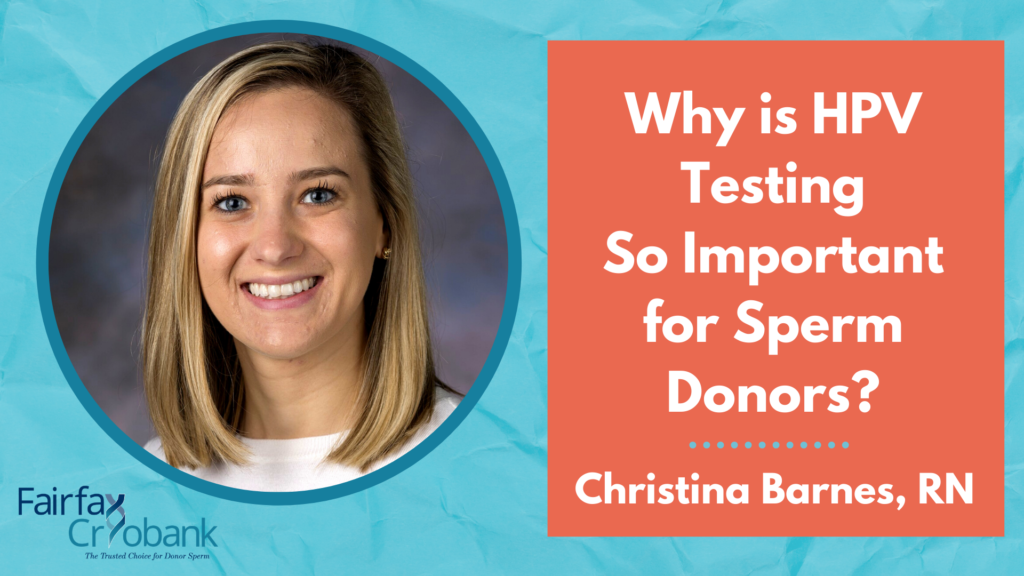Why is HPV Testing So Important for Sperm Donors?
Guest Blogger, Christina Barnes, RN, writes about the risks of HPV and the importance of testing for sperm donors.

What is HPV?
Human papillomavirus, or HPV, is a sexually transmitted virus. HPV is the most common sexually transmitted infection in the world. According to the CDC, it is believed that 80 percent of sexually active individuals will be exposed to HPV at some point in their lifetimes. The virus is most common in people 15 to 25 years old, about a decade after they begin having sexual relations with others.
There are more than 200 types of HPV. Some are known to cause certain symptoms more than others, such as genital warts or cervical cancer. Depending on the type, HPV can live in the mouth, throat, vagina, penis, and/or anus. However, many people may not even know that they have been infected, since many infected people do not have symptoms. Most HPV infections will resolve in about 12 months. Some HPV infections may last longer, but fortunately HPV is not automatically a permanent infection, as with herpes or HIV.
How Does HPV Spread?
HPV is spread through sexual contact: vaginal, anal, or oral sex. Unlike other sexually transmitted infections, though, HPV does not need penetrative intercourse in order to spread. HPV can spread through skin cells of the infected person touching the skin, mouth or genitals of the other person. It can even spread from one spot to another in the same person – In one study from Australia, scientists found that women with vaginal HPV who wiped front-to-back with toilet paper were more likely to have anal HPV. Women who “dabbed” after urinating and did not wipe front-to-back were less likely to have anal HPV.1
In short, HPV spreads easily and frequently.
Diseases Caused by HPV
HPV can cause a number of serious diseases in both men and women.
- Cervical Cancer
- Vulvar and Vaginal Cancer
- Nongenital Warts
- Genital Warts
- Anal Cancer
- Oropharyngeal Cancer (Head and Neck Cancer)
- Penile Cancer and Lesions
A mother who has HPV can pass the virus to her newborn during childbirth. In very rare cases, a newborn exposed to a specific strain of HPV during childbirth can develop recurrent respiratory papillomatosis, or RRP. This is a disease in which benign (noncancerous) tumors grow in the airway, usually around the larynx (voice box). These tumors can be problematic if they grow large enough to block the airway. RRP can also occur in adults who contract the virus through sexual contact.
1Simpson, S., Blomfield, P., Cornall, A., Tabrizi, S., Blizzard, L., & Turner, R. (2016). Front-to-back & dabbing wiping behaviour post-toilet associated with anal neoplasia & HR-HPV carriage in women with previous HPV-mediated gynaecological neoplasia. Cancer Epidemiology,42(124).

Why is HPV Testing Important for Sperm Donors?
Sperm donors are real men who may be having sexual relations with other people – this seems obvious, but it’s important to remember. Since HPV can spread through skin-to-skin contact and non-penetrative sexual acts, a donor can still get HPV even if he always wears a condom and practices safe sex. And since HPV is often asymptomatic (meaning the infected person has no symptoms), a donor’s partner may not know that he or she has the virus, and the donor may not know that he has caught the virus.
If a sperm donor becomes infected with HPV, his sperm can spread the virus during insemination. A woman using his sperm could become infected with HPV, even if she never has physical contact with the donor himself. If the woman becomes infected with HPV, her infant could get HPV during birth or afterwards.
How is HPV Testing Done on Sperm Donors?
The FDA requires all sperm banks to screen their donors for HPV through physical exams and medical histories. This means that the medical staff at a sperm bank will look for any signs of HPV on a physical exam, and will ask the donor questions about his medical and sexual history that may indicate a past or present HPV infection. The FDA does not require DNA based testing of HPV for sperm donors.
Fairfax Cryobank is the only sperm bank to perform DNA based HPV testing on their donors’ semen, in addition to following the FDA guidelines mentioned above. They test each donor’s semen samples every 3 months to increase the possibility of detecting a new infection. Through DNA testing, Fairfax Cryobank tests for the 2 strains of HPV that are most frequently associated with cervical cancer.
Why don’t all sperm banks use DNA based testing for HPV? This type of testing is expensive, and it requires a partnership with a sophisticated infectious disease laboratory that has experience with testing semen. Fairfax Cryobank’s parent company, Genetics and IVF Institute, has well-established laboratories and specialists who know how to run these complicated tests.
What Can I Do to Protect Myself From HPV?
Get vaccinated: the HPV vaccine is recommended for everyone (males and females) ages 9 through 26. The vaccine is given in either 2 or 3 doses, depending on how old you are when you start. The goal of the vaccine is to protect yourself before you are exposed to an infection – meaning, before you become sexually active. This is why the vaccine is started in childhood, but may still be beneficial for adults. Talk with your primary care doctor or OB-GYN if you haven’t been vaccinated and want to know more. You can also check out the CDC’s website on HPV vaccination here: https://www.cdc.gov/hpv/parents/vaccine-for-hpv.html
Practice Safe Sex: Condoms won’t completely prevent the spread of HPV, but they will help reduce the risk of getting the virus. So you should still wear a condom. HPV aside, condoms are crucial in preventing other STDs, such as HIV, gonorrhea, and chlamydia.
Cervical Cancer Screenings: Pap smears screen for HPV and cervical cancer, so make sure you follow your OB-GYN or midwife’s recommendations for regular exams. These screenings can catch cancerous cells early in the process, when they’re easier to treat with much better outcomes.
Want More Information on HPV?
CDC HPV Fact Sheet: https://www.cdc.gov/std/hpv/stdfact-hpv.htm
CDC Vaccine for HPV (also included above): https://www.cdc.gov/hpv/parents/vaccine-for-hpv.html
HPV Testing FAQ: https://fairfaxcryobank.com/hpv-faqs







